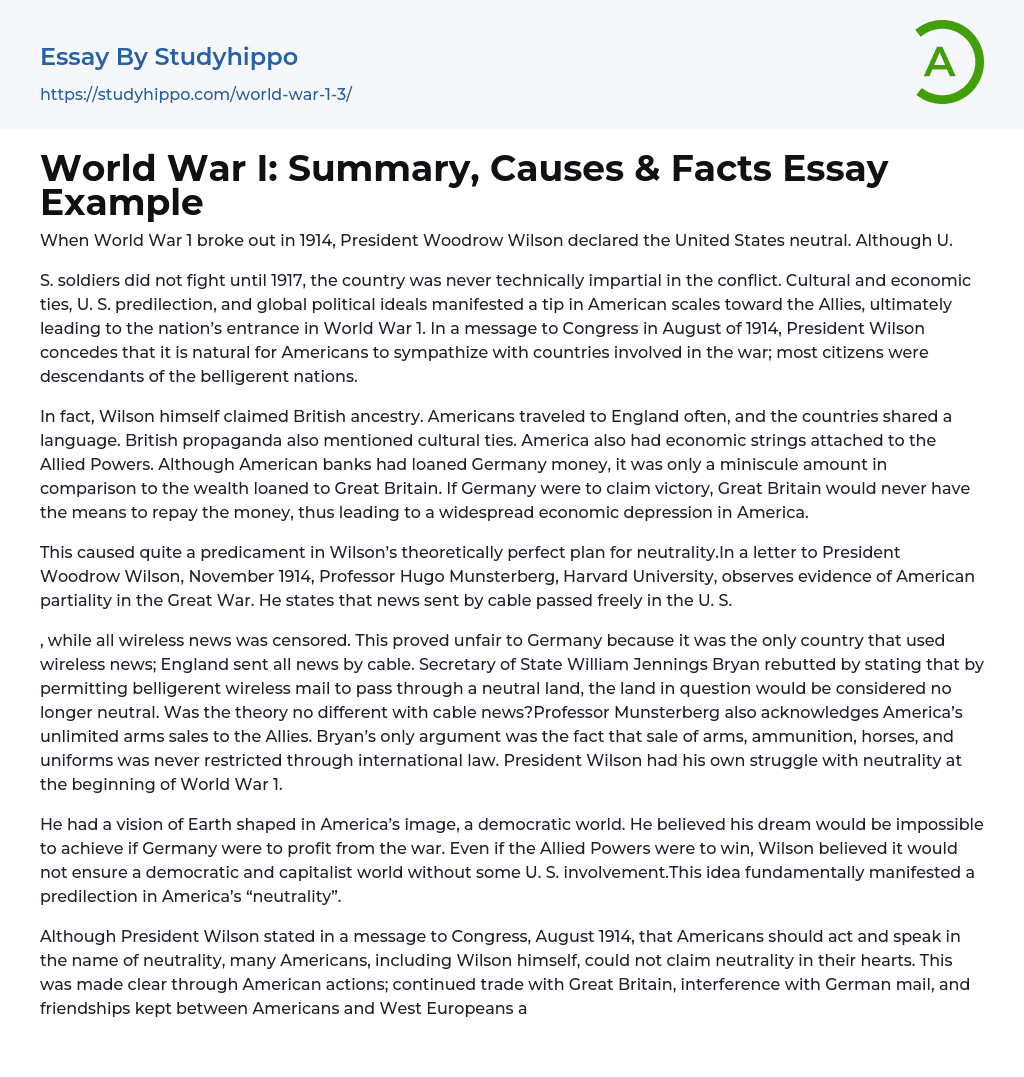When World War 1 broke out in 1914, President Woodrow Wilson declared the United States neutral. Although U.
S. soldiers did not fight until 1917, the country was never technically impartial in the conflict. Cultural and economic ties, U. S. predilection, and global political ideals manifested a tip in American scales toward the Allies, ultimately leading to the nation’s entrance in World War 1. In a message to Congress in August of 1914, President Wilson concedes that it is natural for Americans to sympathize with countries involved in the war; most citizens were descendants of the belligerent nations.
In fact, Wilson himself claimed British ancestry. Americans traveled to England often, and the countries shared a language. British propaganda also mentioned cultural ties. America also had economic strings attached to the Allied Powers. Although American banks
...had loaned Germany money, it was only a miniscule amount in comparison to the wealth loaned to Great Britain. If Germany were to claim victory, Great Britain would never have the means to repay the money, thus leading to a widespread economic depression in America.
This caused quite a predicament in Wilson’s theoretically perfect plan for neutrality.In a letter to President Woodrow Wilson, November 1914, Professor Hugo Munsterberg, Harvard University, observes evidence of American partiality in the Great War. He states that news sent by cable passed freely in the U. S.
, while all wireless news was censored. This proved unfair to Germany because it was the only country that used wireless news; England sent all news by cable. Secretary of State William Jennings Bryan rebutted by stating that by permitting belligerent wireless mail to pass through a neutral land,
the land in question would be considered no longer neutral. Was the theory no different with cable news?Professor Munsterberg also acknowledges America’s unlimited arms sales to the Allies. Bryan’s only argument was the fact that sale of arms, ammunition, horses, and uniforms was never restricted through international law. President Wilson had his own struggle with neutrality at the beginning of World War 1.
He had a vision of Earth shaped in America’s image, a democratic world. He believed his dream would be impossible to achieve if Germany were to profit from the war. Even if the Allied Powers were to win, Wilson believed it would not ensure a democratic and capitalist world without some U. S. involvement.This idea fundamentally manifested a predilection in America’s “neutrality”.
Although President Wilson stated in a message to Congress, August 1914, that Americans should act and speak in the name of neutrality, many Americans, including Wilson himself, could not claim neutrality in their hearts. This was made clear through American actions; continued trade with Great Britain, interference with German mail, and friendships kept between Americans and West Europeans all added to a noticeable slant in U. S. neutrality. It could not have come as a shock to the world when President Wilson declared war in April 1917.
- Non-Commissioned Officer essays
- Sergeant essays
- Business Law essays
- Contract essays
- Consumer Protection essays
- Property essays
- Ownership essays
- Agreement essays
- Common Law essays
- Contract Law essays
- Justice essays
- Security essays
- Tort Law essays
- United States Constitution essays
- Crime essays
- Lawsuit essays
- Treaty essays
- Family Law essays
- Marijuana Legalization essays
- Constitution essays
- War on Drugs essays
- Court essays
- Jury essays
- Police essays
- Protection essays
- Community Policing essays
- Criminal Law essays
- Judge essays
- Lawyer essays
- Employment Law essays
- Copyright Infringement essays
- Injustice essays
- Intellectual Property essays
- Breach Of Contract essays
- Jurisprudence essays
- Social Injustice essays
- Juvenile Justice essays
- Internet Privacy essays
- Cyber Security essays
- Bill Of Rights essays
- Civil Liberties essays
- First Amendment To The United States Constitution essays
- Fourth Amendment To The United States Constitution essays
- Second amendment essays
- Animal Cruelty essays
- Law Enforcement essays
- Juvenile Justice System essays
- Surveillance essays
- Forensic Science essays
- Crime Prevention essays




